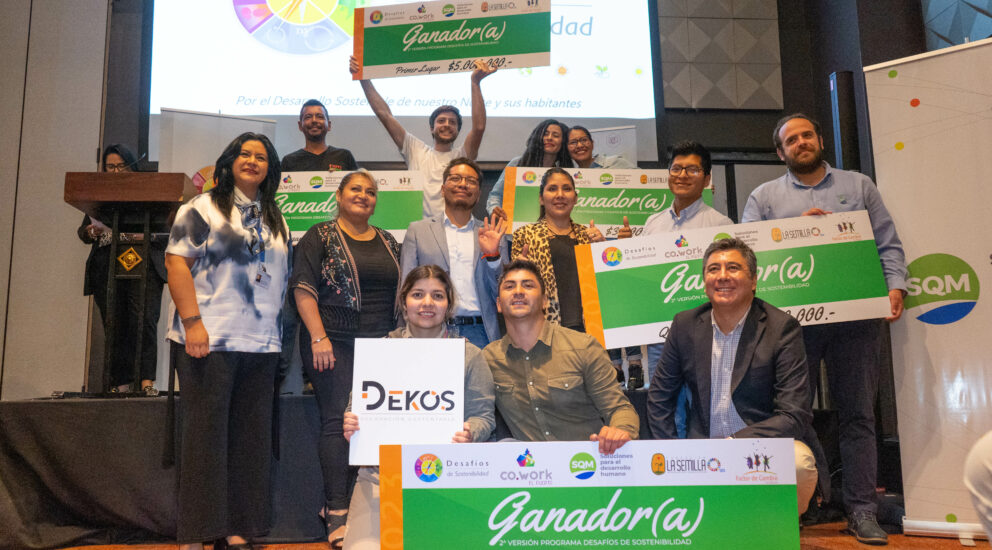
Circular Economy and Sustainable Agriculture Ventures Take Top Prizes at the Second Version of the Sustainability Challenges Program
13/Apr/2023
The program’s final event was attended by 18 entrepreneurs from Antofagasta, Calama, Tocopilla, María Elena and San Pedro de Atacama who defended their projects before a jury of public and private sector representatives.
The final ceremony of the Sustainability Challenges Program was the culmination of 5 months of work among entrepreneurs, small- and medium-sized business owners and social organizations in the Antofagasta Region. The program, co-organized by El Puerto Cowork, SQM, La Semilla Foundation and Factor de Cambio Foundation, awarded the 5 top projects selected from a wide range of proposals focused on the environment, the circular economy, sustainable agriculture and/or gender identity and inclusion.
First place went to “Agropelo” by Matías Carenini (Antofagasta), with an award of five million pesos. In second place was “Dekos,” by Felipe Dorich (Calama), with a prize of four million pesos. “Tenemos derecho a reciclar” (We have the right to recycle) by Reyna Calle and Rocío Araya (Calama), won third place and three million pesos. “Expodesierto” by Héctor Vera (Antofagasta) earned fourth place and two million pesos, while “Planeta Agrícola” by Fernando Salinas (Antofagasta) placed fifth, winning one million pesos.
Pablo Pisani, Director of Communities and Public Affairs for SQM’s Nitrate and Iodine businesses, commented, “We are extremely happy to conclude this comprehensive process, which began five months ago with these entrepreneurs. Today, we have more evolved projects that focus on sustainability and caring for the environment, and we hope to continue supporting them by providing tools to bring these contributions to the planet to life and develop them commercially. Through this program, we are striving to create value in our communities and in the territories where we operate.
Humberto González, head of El Puerto Cowork, affirmed, “The invitation generated great interest from the start. We received 325 proposals, which shows that people are highly motivated to launch enterprises focused on concerns that cut across sectors and affect everyone, and to provide answers and solutions to problems in different localities.
The jury for the award ceremony consisted of public and private sector executives and productive development experts, including Melissa Gajardo, Executive Director of the Antofagasta Corfo Committee and the Regional Innovation Board. Ms. Gajardo commented, “At the Regional Productive Development Committee, we are not focused solely on large-scale projects, so it is very important that we are invited to these events, both to learn about the projects, to find out what’s happening in the different communities, and to forge strategic alliances.
Jury member Kevyn Galleguillos, Director of Sercotec Antofagasta, affirmed that “one of the government’s objectives is to work with SMEs, through collaboration between public and private sector institutions focused on sustainable ecosystems, sustainability, the circular economy, reducing gender gaps and strengthening women’s empowerment and economic autonomy. We have seen all these areas addressed today, so it is evident there is tremendous potential at the regional level for developing this type of project.”
Testimonials
Matías Carenini, first place winner in the Sustainability Challenges with his project “Agropelo,” said he uses “mulch made from human hair recovered from hairdressers to aid crop development in the Antofagasta Region. We can reduce the use of irrigation water by 48% and repurpose this waste, which amounts to more than 500 tons per month here in Chile. We can regenerate the soil and improve agriculture in the desert.”
For his part, Felipe Dorich, who won second place with his “Dekos” project, commented, “We manufacture coatings from recycled plastics revalorized from Calama and the Antofagasta Region. We contribute to the circular economy. We were delighted to participate and are very happy.”
Reyna Calle and Rocío Araya, third place winners, with their project “Tenemos derecho a reciclar” (We have the right to recycle), said that “this is a women’s enterprise dedicated to the recovery of waste, plastics and non-hazardous post-consumer aluminum. Our service benefits the community through the recovery of this waste by installing recycling centers in Calama.”
Héctor Vera, fourth place winner with the project “Expodesierto,” explained, “We do sustainable hydroponics in the desert, so we are very happy to have received fourth place, and to have participated in this invitation alongside very good projects.”
Fernando Salinas, who earned fifth place with his venture “Planeta Agrícola,” commented, “Participating in the second stage of the project helped us to improve our business and marketing skills. We are going to use this award to boost our growth and include more aromas, more plants, to build a larger stock of infusions and condiments for people based on this sustainable production system.”
The Sustainability Challenges Program operates in the Antofagasta and Tarapacá regions, offering in-person and online workshops on sustainability, the circular economy, business models and pitch presentations, as well as personalized advice and prizes for the top proposals in each territory.
After the award ceremony, a new program entitled “Sustainable DNA” was launched for all finalists who pitched their projects at the closing event. In it, they will receive support to strengthen their initiatives and find new sources of financing to commercially develop their proposals.